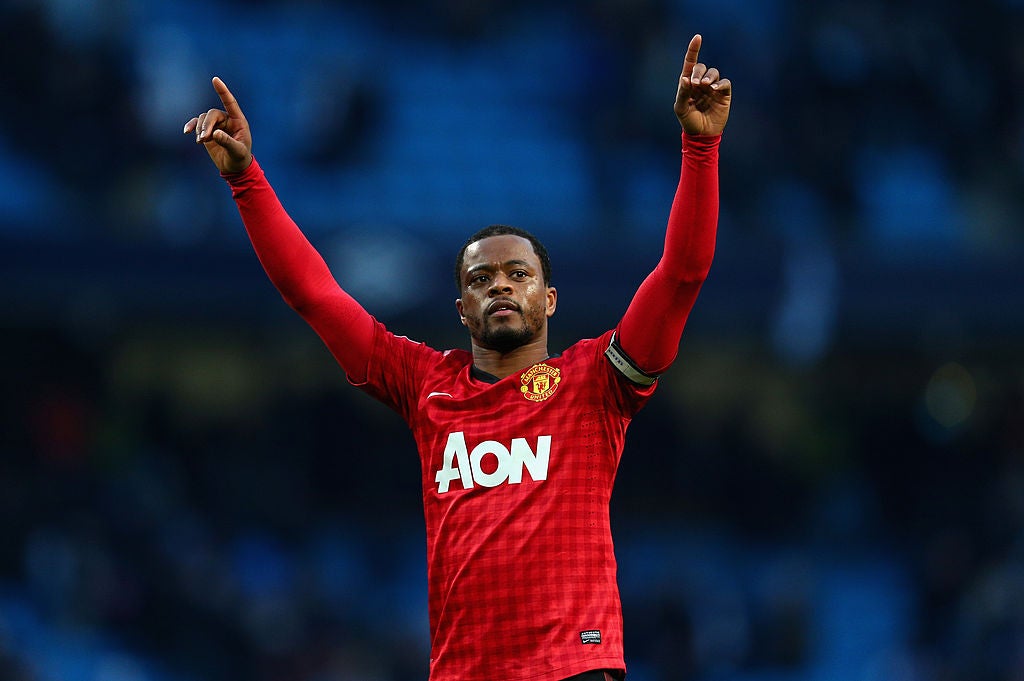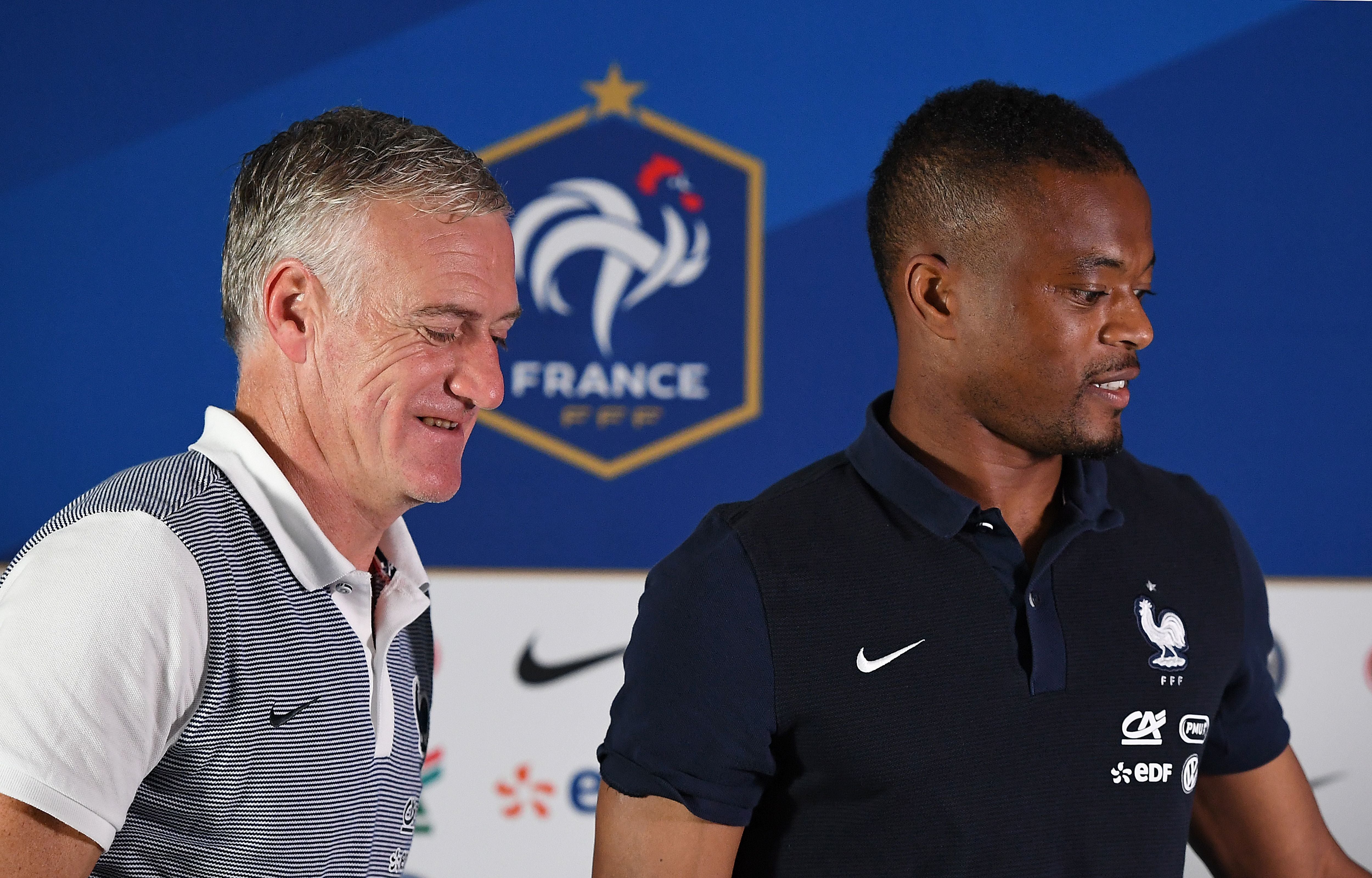
In his post-football career, Patrice Evra has become known for raising eyebrows, and there are two surprises as he sits down to chat in circular glasses and a velvet jacket.
The first is that he was once completely against social media. The second is that Sir Alex Ferguson is now thoroughly entertained by it.
“Ferguson used to say to us ‘I don’t want to see anyone on social media, we’ve got too much to focus on’,” Evra laughs. “But now Sir Alex Ferguson is asking me: ‘Patrice, can you send me that video because it was really funny, to send it to my friends.’”
Evra could be talking about any one of them, from the Oasis wigs to the Batman costume, but it would be a mistake to dismiss all of this as just jokes. To the 41-year-old, the funny side has a serious purpose. It is to draw people in, and then branch out.
“I feel like on social media I gain my freedom,” he says. “I didn’t realise. I did it because people were doing fake accounts, then because I enjoyed it, then I realised actually I’m gaining my freedom. I get people calling to do things I would never imagine – so this is really important. Of course, you have to use it in the right way, with millions of people following you, millions of people are listening about what you say… but I’m not perfect, sometimes.”
But he is trying to do better. Evra is sitting down with The Independent at the Web Summit in Lisbon, where he was looking for sustainable and progressive businesses to invest in, particularly as regards climate change. While the Manchester United legend does want to get back to football at some point, his current focus is to use his very football profile to have some positive effect.
“I came to Web Summit to learn, to meet people, because me and my partner want to invest in start-ups,” Evra explains. “I want to invest and support young entrepreneurs with a lot of creative ideas, to change the world – that’s why I’m on social media, to reach as many people as I can, make them aware of my activity. I’m a massive activist for ending violence against children. I had my speech at the United Nations. Climate change is a big one.
“That’s why I want to start from scratch. Football is a massive community, a massive platform. It’s a universal language. Footballers are so recognised. It’s so powerful. All those players now become a brand, they have more responsibility.
“But don’t forget, they are football players, they will make mistakes. You need to really care about that.”
Evra includes himself in that. “Sometimes I will do something, some people won’t like it but actually I’m myself. I don’t want to act. I don’t want to pretend. If I’m sad, I won’t do a video where I pretend to be laughing or smiling. I’m not like that. What you see on social media is who I am. It’s not like two Patrices.
“Imagine if people don’t know me on social media, and only on the pitch, from interviews. Before that, a football player, they’re going to say ‘stay in your lane, go and kick the ball around’. And I decide to do that, not to prove anything to anybody else, it’s just that’s what I feel like, to compete and contend, that’s exactly what I’m doing, travelling, meeting people, learning about different things that I didn’t know before. I have a good team now, investment, business, so I just feel grateful and blessed.”
There is another surprise, though. Given this effect, an obvious question is whether Evra wished he’d gone on social media sooner. He actually says otherwise.
“I don’t think I would be able to do all this content when I was playing on my highest level. It’s impossible. When you want to stay at the top of the pyramid, it’s when you need to make sacrifices. You have to make sure your priority is football. It’s performing.”
This is the thing that is so notable with Evra. When he’s into something, he is fully committed. He goes with everything. So, now the conversation turns to football, he talks about how he was actually one of the first modern full backs. Trent Alexander-Arnold could perhaps do with talking to him.
“Exactly,” he exclaims. “When I hear people say ‘full back this’… full back is one of the most difficult positions, because you need to find the balance. If you’re attacking too much, people say you’re a bad defender. If you defend, they’re going to say you’re a bad attacker. I started as a striker, then the left-wing. I never expected to be left-back, but I remember [Didier] Deschamps saying ‘this is your strength’. It was only when I went to England I enjoyed playing left-back because I understood, when you do a tackle, when you do a block, the fans respond the same way as when you score a goal or a nutmeg. That’s why I started finding that balance. Sometimes Ferguson was like ‘you need to defend as well’. I was like ‘Boss, the best way of defending is attacking’.
“I remember before the games, me and Cristiano Ronaldo, I was never looking at the right winger, always the right back, because I was like ‘I’m going to hurt him’.
“I was like ‘my winger, he will have to follow me, and if I keep attacking, and he doesn’t defend, his manager is going to sub him, so he won’t have the same energy. That was my philosophy. That’s why I wanted to be an attacking full back.”

As Evra references, it was Deschamps who first intuited he might make a good left back when they were together at Monaco. They went to the 2004 Champions League final, only to be beaten by Jose Mourinho’s FC Porto, but a bond had been forged. Evra’s relationship with the current France manager is similar to that with Ferguson. So much so that, when Deschamps was attempting to rally a squad to win the 2018 World Cup, he ensured Evra was there as an influence.
The left back had been there for the start of the Deschamps cycle, at the 2014 World Cup and the Euro 2016 final defeat, but doesn’t feel any way resentful that he missed out on the 2018 victory. Quite the opposite.
“I’ve got so many bad experiences in the national team, to be honest, that I wanted to retire [in 2012]. And Didier Deschamps said ‘Patrice, I’m in charge, I need you, I need you’.
“I was like, ‘I love my country but in United I’m successful, in France, it’s always trouble, we have the best player in the world, Thierry Henry, and we don’t even come out of the group stage’. It was difficult. But Deschamps knows how to build a squad. I’m not talking about a team, I’m talking about a squad. Didier Deschamps can get rid of the right player if he doesn’t have the right attitude. He didn’t select Karim Benzema for five or six years, and look.”
Evra is obviously hinting at the debacle of 2010, when a split in the French camp led to revolt against the unpopular Raymond Domenech and a first-round elimination. He no longer seems willing to criticise his former manager directly, but it’s easy to read between the lines – and realise why the French shouldn’t have such fears this time.
“You need to understand those big football nations are big players, big egos. That’s why you need a boss. You need a real boss. Like, imagine if you have to control Patrice Evra, Lilian Thuram, [Claude] Makelele, Henry, [Marcel] Desailly… you need someone, and for few years we didn’t have someone. That’s why there was a lot of complaining.”
Deschamps has always sought to stamp that out – which is where Evra came in for 2018.

“In Russia, I had a dinner with the French national team at the group stage. I was talking to them and did a speech saying ‘guys, enjoy. Enjoy, because now I realise what a real World Cup is.’ You know, some players are going to say ‘it’s a dream like when I was a kid’ but they don’t feel it. They say it because they have to say it but actually they don’t know. You can’t. It’s when you retire, you realise how big it is, a World Cup.
“I didn’t understand that. When you’re playing for a big club, playing in Champions League, winning Champions League, for you, it’s granted. You need to play for your national team. You’re the best. But it’s different. You play for your country. You play for the people. You solve so many problems from the economy of the country just when you win a trophy. You see the [England] women winning the Euros. You forget everything. That’s why I say to players, ‘when you are picked for your national team, it becomes politics’. And, I’m sorry, you need to feel the weight. You’re not playing for your club. It’s a massive difference. Unfortunately, it’s only with experience, and sometimes even when you retire, you’re going to realise that… the magic of it.”
Some of Evra’s sentiments evidently sank in.
“I remember, when France won it, Deschamps and Paul Pogba did a Facetime and the first thing they were saying was ‘Patrice, thank you!’ Because I feel I was part of this generation. I saw them grow up. They were calling me ‘Uncle Pat’ and when they won it, I feel I won it. I wasn’t jealous or whatever. I was part of it, because I was through the bad France and the good one and, finally for me, I was like ‘I did my job. Unfortunately, I didn’t win it in 2016 with you guys, I didn’t make it for the World Cup but job done.’
“Job done.”
And now, on to other business.







